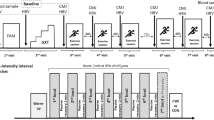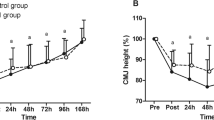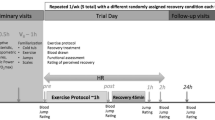Abstract
This study examined the effects of cold water immersion (CWI) on recovery of neuromuscular function following simulated team-sport exercise in the heat. Ten male team-sport athletes performed two sessions of a 2 × 30-min intermittent-sprint exercise (ISE) in 32°C and 52% humidity, followed by a 20-min CWI intervention or passive recovery (CONT) in a randomized, crossover design. The ISE involved a 15-m sprint every minute separated by bouts of hard running, jogging and walking. Voluntary and evoked neuromuscular function, ratings of perceived muscle soreness (MS) and blood markers for muscle damage were measured pre- and post-exercise, immediately post-recovery, 2-h and 24-h post-recovery. Measures of core temperature (Tcore), heart rate (HR), capillary blood and perceptions of exertion, thermal strain and thirst were also recorded at the aforementioned time points. Post-exercise maximal voluntary contraction (MVC) and activation (VA) were reduced in both conditions and remained below pre-exercise values for the 24-h recovery (P < 0.05). Increased blood markers of muscle damage were observed post-exercise in both conditions and remained elevated for the 24-h recovery period (P < 0.05). Comparative to CONT, the post-recovery rate of reduction in Tcore, HR and MS was enhanced with CWI whilst increasing MVC and VA (P < 0.05). In contrast, 24-h post-recovery MVC and activation were significantly higher in CONT compared to CWI (P = 0.05). Following exercise in the heat, CWI accelerated the reduction in thermal and cardiovascular load, and improved MVC alongside increased central activation immediately and 2-h post-recovery. However, despite improved acute recovery CWI resulted in an attenuated MVC 24-h post-recovery.



Similar content being viewed by others
References
Allen GM, Gandevia SC, McKenzie DK (1995) Reliability of measurements of muscle strength and voluntary activation using twitch interpolation. Muscle Nerve 18:593–600
Ascensão A, Leite M, Rebelo AN, Magalhäes S, Magalhäes J (2011) Effects of cold water immersion on the recovery of physical performance and muscle damage following a one-off soccer match. J Sports Sci 29:217–225
Bailey DM, Erith SJ, Griffin PJ, Dowson A, Brewer DS, Gant N, Williams C (2007) Influence of cold-water immersion on indices of muscle damage following prolonged intermittent shuttle running. J Sports Sci 25:1163–1170
Banfi G, Melegati G, Valentini P (2007) Effects of cold-water immersion of legs after training session on serum creatine kinase concentrations in rugby players. Br Med J 41:339–340
Barnett A (2006) Using recovery modalities between training sessions in elite athletes: does it help? Sports Med 36:781–796
Bleakley CM, McDonough SM, MacAuley DC (2004) The use of ice in the treatment of acute soft-tissue injury: a systematic review of randomised controlled trials. Am J Sports Med 32:251–261
Cannon J, Kay D, Tarpenning K, Marino FE (2006) Normalized lengthening peak torque is associated with temporal twitch characteristics in elderly women but not young women. Acta Physiology Scandinavia 188:53–62
Cram JR, Kasman GS (1998) Introduction to surface electromyography. Aspen Publishers, Gaithersburg
Duffield R, Marino FE (2007) Effects of pre-cooling procedures on intermittent-sprint exercise performance in warm conditions. Eur J Appl Physiol 100:727–735
Eston R, Peters D (1999) Effects of cold water immersion on the symptoms of exercise-induced muscle damage. J Sports Sci 17:231–238
Halson S, Quod MJ, Martin DT, Gardner AS, Ebert TR, Laursen PB (2008) Physiological responses to cold water immersion following cycling in the heat. Int J Sports Physiol Perform 3:331–346
Hargreaves M (2004) Muscle glycogen and metabolic regulation. Proceedings of the Nutrition Society: 217–220
Howatson G, Gaze D, van Someren KA (2005) The efficacy of ice massage in the treatment of exercise-induced muscle damage. Scand J Med Sci Sports 15:416–422
Ingram J, Dawson B, Goodman C, Wallman K, Beilby J (2009) Effect of water immersion methods on post-exercise recovery from simulated team sport exercise. J Sci Med Sport 12:417–421
Jakeman J, Macrae R, Eston R (2009) A single 10-min bout of cold-water immersion therapy after strenuous plyometric exercise has no beneficial effect on recovery from the symptoms of exercise-induced muscle damage. Ergonomics 52:456–460
Knight K (1989) Cryotherapy in sports injury management. Int Perspect Physiother 4:163–185
Knight K, Brucker J, Stoneman P, Rubley M (2000) Muscle injury management with cryotherapy. Athl Ther Today 5:26–51
Martin PG, Marino FE, Rattey J, Kay D, Cannon J (2004) Reduced voluntary activation of human skeletal muscle during shortening and lengthening contractions in whole body hyperthermia. Exp Physiol 90:225–236
Morrison SA, Sleivert GG, Cheung SS (2004) Passive hyperthermia reduces voluntary activation and isometric force production. J Appl Physiol 91:729–736
Nielsen B, Nybo L (2003) Cerebral changes during exercise in the heat. Sports Med 33:1–11
Nielsen B, Hyldig T, Bidstrup F, Gonzalez-Alonso J, Christoffersen G (2001) Brain activity and fatigue during prolonged exercise in the heat. Pflügers Arch Eur J Physiol 442:41–48
Nybo L, Nielsen B (2001) Hyperthermia and central fatigue during prolonged exercise in humans. J Appl Physiol 91:1055–1060
Parouty J, Al Haddad H, Quod M, Leprêtre PM, Ahmaidi S, Buchheit M (2010) Effect of cold water immersion on 100-m sprint performance in well-trained swimmers. Eur J Appl Physiol 109:483–490
Peiffer JJ, Abbiss CR, Nosaka K, Peake JM, Laursen PB (2009) Effect of cold water immersion after exercise in the heat on muscle function, body temperatures and vessel diameter. J Sci Med Sports 12:91–96
Peiffer JJ, Abbiss CR, Watson G, Nosaka K, Laursen PB (2010a) Effect of 5-min cold-water immersion recovery on exercise performance in the heat. Br J Sports Med 44:461–465
Peiffer JJ, Abbiss CR, Watson G, Nosaka K, Laursen PB (2010b) Effect of cold water immersion on repeated 1-km cycling performance in the heat. J Sci Med Sport 13:112–116
Portney LG, Watkins MP (2009) Foundations of Clinical Research: Applications to Practice. Prentice Hill, Upper Saddle River
Rowsell G, Coutts A, Reaburn P, Hill-Haas S (2009) Effects of cold-water immersion on physical performance between successive matches in high-performance junior male soccer players. J Sports Sci 27:565–573
Rowsell G, Coutts A, Reaburn P, Hill-Haas S (2011) Effect of post-match cold-water immersion on subsequent match running performance in junior soccer players during tournament play. J Sports Sci 29:1–6
Saboisky J, Marino FE, Kay D, Cannon J (2003) Exercise heat stress does not reduce central activation to non-exercised human skeletal muscle. Exp Physiol 88:783–790
Thomas M, Cheung S, Elder G, Sleivert G (2006) Voluntary muscle activation is impaired by core temperature rather than local muscle temperature. J Appl Physiol 100:1361
Tucker R, Rauch L, Harley YXR, Noakes TD (2004) Impaired exercise performance in the heat is associated with an anticipatory reduction in skeletal muscle recruitment. Pflügers Arch Eur J Physiol 448:422–430
Vaile J, Halson S, Gill N, Dawson B (2008a) Effect of cold water immersion on repeat cycling performance and thermoregulation in the heat. J Sports Sci 26:431–440
Vaile J, Halson S, Gill N, Dawson B (2008b) Effect of hydrotherapy on the signs and symptoms of delayed onset muscle soreness. Eur J Appl Physiol 102:447–455
Vaile J, O’Hagan C, Stefanovic B, Walker M, Gill N, Askew CD (2010) Effect of cold water immersion on repeated cycling performance and limb blood flow. Br J Sports Med. doi:10.1136/bjsm.2009.067272 EPub ahead of print
Wilcock IM, Cronin JB, Hing WA (2006) Physiological response to water immersion: A method for sport recovery? Sports Med 36:747–765
Wilder MR, Cannon J (2009) Effect of age on muscle activation and twitch properties during static and dynamic actions. Muscle Nerve 39:683–691
Yamane M, Teruya H, Nakano M, Ogai R, Ohnishi N, Kosaka M (2006) Post-exercise leg and forearm flexor muscle cooling in humans attenuates endurance and resistance training effects on muscle performance and on circulatory adaptation. Eur J Appl Physiol 96:572–580
Yeargin SW, Casa DJ, McClung JM, Knight CJ, Healey JC, Goss JP, Harvard WR, Hipp GR (2006) Body cooling between two bouts of exercise in the heat enhances subsequent performance. J Strength Cond Res 20:383–389
Acknowledgments
The authors would like to thank the subjects for their participation and enthusiasm. In addition, the authors would like to acknowledge the staff at Bathurst Pathology for their assistance with the blood analysis and Gary McKenzie at SPAN for his help with EMG analysis.
Author information
Authors and Affiliations
Corresponding author
Additional information
Communicated by Narihiko Kondo.
Rights and permissions
About this article
Cite this article
Pointon, M., Duffield, R., Cannon, J. et al. Cold water immersion recovery following intermittent-sprint exercise in the heat. Eur J Appl Physiol 112, 2483–2494 (2012). https://doi.org/10.1007/s00421-011-2218-3
Received:
Accepted:
Published:
Issue Date:
DOI: https://doi.org/10.1007/s00421-011-2218-3




